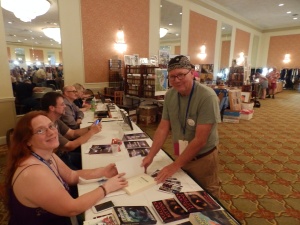
I get all metaphorical, and as snarky as I ever get, this morning over at Mad Genius Club. I’m the nice one, over there, but really… they are just special, aren’t they?
Books are, as this article eloquently puts it, emotional artifacts. GigaOm: “What makes Amazon’s dispute with publishers different from a typical battle between a retailer like Walmart and a supplier, of course, is that books are not toothpaste or toilet paper. They are a cultural artifact that brings all kinds of emotional baggage with it, involving the struggling author, the nature of the creative impulse and other intangibles. And yet, they are also a physical product — one that is going through the same kind of wrenching change that any other kind of content is, from newspapers to music. All we know for sure is that the market cannot remain the same, and the forces that are trying desperately to make it do so are on the wrong side of history and are likely doomed.”
Of course fiction books are emotional. That’s sort of the point. I pour emotion in when I’m writing, and readers pull it out again, filtered through their own lens of experience. But the selling of books shouldn’t be an emotional thing. We author-artists have all the feels when it comes to our books. It’s hard to turn that off and put the businesswoman hat on (mine is a lovely big white one, like Audrey Hepburn would wear in a movie) to make decisions about those books. But we have to, or we’ll starve.
I’ve been inspired recently by this post on Passive Voice, about Indie Authors quitting their day jobs. In a world where small-time authors have been ground into the dirt beneath the heel of Big Publishing, Amazon is giving them a hand up. Sure, Amazon isn’t perfect – I call them reptilian in the MGC post and I’m serious. But we have the ability to walk away if it becomes an abusive relationship. Hachette authors don’t. Well, they do, but they lose their books to the maw of an uncaring business.
So it’s time to pull out your calculator, and do some figures. How much does it cost to produce your book? How much profit can you make if you price it at 0.99, 4.99, or 9.99? What do you want from it? Just the reassurance that someone is reading your work? Then 0.99 (I’m talking novel-length work here, BTW). If you want to make some money and encourage return business, shoot for 3.99 -4.99. If you’re not wanting anyone to read you but the ‘right sort’, then you do the 9.99. Frankly, readers won’t put that much out for an unknown author. They *might* for an author they know and like. But they’re more likely to head over to the library and check a copy out. Why do you think big publishing is crying that the sky is falling, ebook sales are shrinking, and ebook licenses to libraries are limited to 26 checkouts? Ebooks won’t fall apart with reading… the reality is that ebook sales are booming, but it’s the Indie authors who are driving the business.
It’s freedom. This is what a free market looks and feels like. Join me in reveling in it. There are no limits, and it’s exhilarating and frightening, and oh, so emotional.


